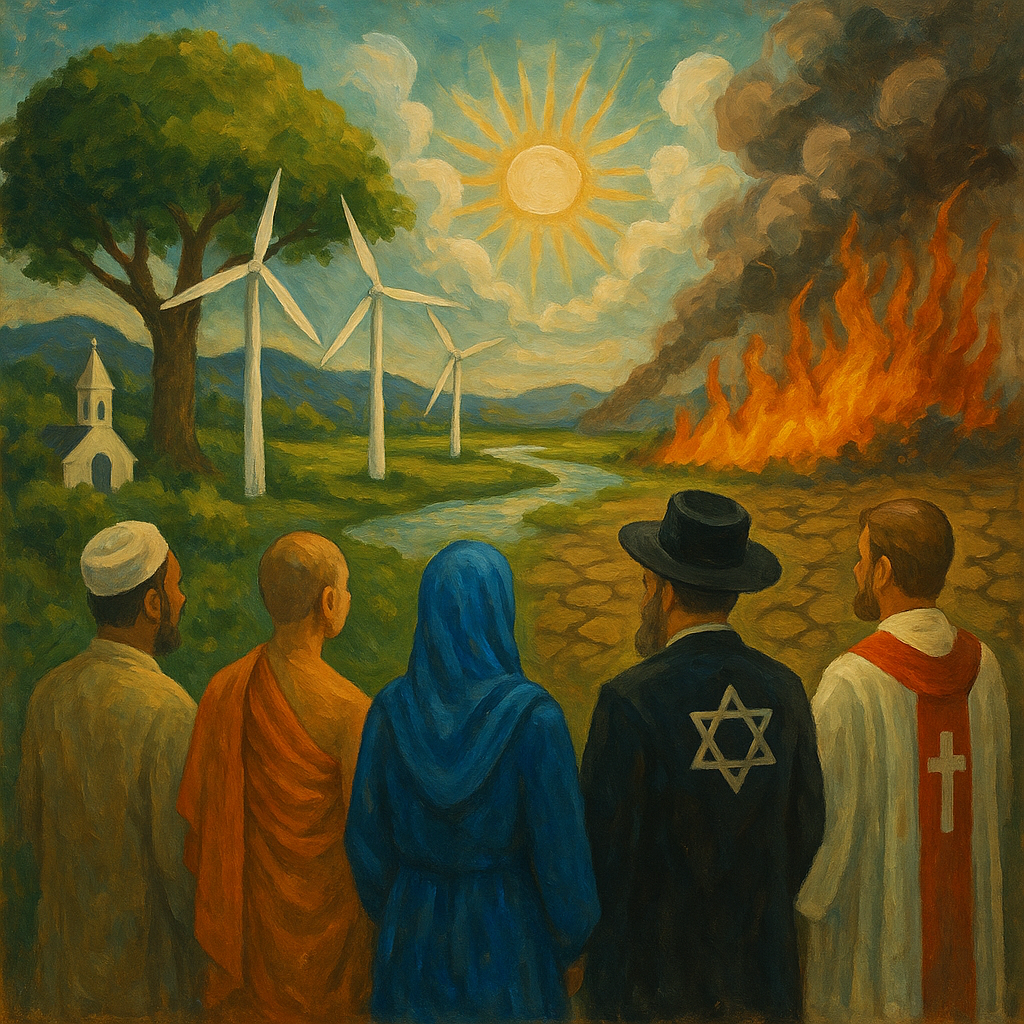Environmental Theology: How Faith Traditions Are Embracing Climate Action
As the world faces intensifying climate crises — melting glaciers, forest fires, and rising seas — the conversation about the planet’s survival is no longer confined to scientists and policymakers. Increasingly, religious and spiritual communities are entering the dialogue with a new sense of moral urgency. Across faith traditions, a movement known as environmental theology is emerging — an interpretation of sacred texts and values that links care for the Earth with spiritual responsibility. From Hindu temples to Christian churches, Sikh gurdwaras to Islamic madrasas, faith traditions are rediscovering ecological wisdom deeply rooted in their teachings and turning belief into environmental action.
The Spiritual Foundation of Ecology
Every major faith tradition has long carried an implicit message of environmental stewardship. In Hinduism, the Earth is revered as Bhoomi Devi, the mother goddess who sustains all life. Rivers like the Ganga and Yamuna are not just water bodies but divine mothers, deserving worship and protection. The Upanishads and Vedas speak of the interconnectedness of all beings — a worldview that naturally aligns with ecological ethics.
In Christianity, the concept of creation care has gained prominence in recent decades. The Bible’s book of Genesis describes humanity as the caretaker of God’s creation, not its master. Pope Francis’s landmark 2015 encyclical Laudato Si’ reframed climate change as a moral and spiritual crisis, urging Catholics worldwide to see environmental protection as an act of faith.
Similarly, Islam teaches khalifa — the principle of stewardship, where humans are trustees of Allah’s creation. The Qur’an emphasizes balance (mizan) in nature, and warns against excess and waste. Sikhism, too, promotes ecological balance through the teachings of Guru Nanak Dev Ji, who viewed all life forms as reflections of the same divine essence.
Thus, the seeds of environmental theology have always been present in faith — but today, they are being actively cultivated into movements for planetary healing.
Temples, Mosques, and Churches Going Green
In recent years, faith institutions themselves have begun transforming their practices to reflect ecological values. Many Hindu temples have banned single-use plastics, adopted solar power, and introduced eco-friendly rituals. The famous Tirumala Tirupati Temple in Andhra Pradesh runs one of India’s largest solar plants, while several Ganga ghats have replaced chemical-based offerings with biodegradable materials.
Churches across Europe, Latin America, and parts of India now hold “Creation Sundays,” where sermons and prayers focus on environmental care. In Kerala, a network of Christian parishes runs tree-planting drives and waste management campaigns inspired by the teachings of Laudato Si’.
Muslim organizations, too, have launched global campaigns. The Green Mosque Initiative promotes energy efficiency, water conservation, and organic farming projects linked to local mosques. During Ramadan, several communities now observe “eco-fasts,” where believers are encouraged to minimize waste and consumption in line with Qur’anic teachings.
In the Sikh community, gurdwaras in Punjab and Canada have installed solar rooftops and initiated tree-planting projects as part of the EcoSikh movement — a global effort that merges faith with climate action.
Youth, Faith, and Climate Activism
A striking aspect of environmental theology’s rise is the growing involvement of young believers. Around the world, youth groups within temples, mosques, churches, and synagogues are taking the lead in organizing climate campaigns. For them, environmental care is not separate from spirituality — it is an extension of it.
In India, young Hindu and Buddhist environmentalists are reviving ancient concepts like ahimsa (non-violence) and aparigraha (non-greed) as ethical frameworks for sustainability. Christian youth networks have mobilized across Asia and Africa under banners like “Faiths for the Future,” demanding that climate policies align with moral responsibility. Muslim and Sikh youth groups are combining social media advocacy with local clean-up projects, giving traditional values new relevance in modern activism.
Theological Shifts: From Ritual to Responsibility
Traditionally, religion has been associated with rituals — offerings, prayers, and festivals. But environmental theology pushes faith communities to go beyond symbolism and adopt tangible responsibility for the planet. It reframes pollution, deforestation, and exploitation not just as ecological issues, but as spiritual transgressions — forms of disrespect toward the divine creation.
This reinterpretation is transforming sermons, curricula, and even festival celebrations. Many temples now advocate eco-friendly Ganesh Chaturthi idols made from clay instead of plaster. Churches hold climate vigils alongside traditional services, and Islamic scholars issue fatwas encouraging sustainable consumption. The goal is not to change faith, but to expand its meaning — from personal salvation to planetary preservation.
Challenges on the Path
Despite growing enthusiasm, the integration of ecology into theology faces obstacles. Many religious institutions struggle with funding, infrastructure, and inertia in adopting green technologies. There are also theological debates — can human suffering from natural disasters be seen purely as divine will, or as a warning about human negligence?
Moreover, large religious gatherings, while spiritually uplifting, often produce significant waste and environmental strain. Transforming these into sustainable events requires both awareness and systemic reform. Yet, many communities are beginning to take the first steps — replacing plastic prasad containers, encouraging carpooling to pilgrimages, and recycling festival decorations.
Faith as a Force for Planetary Healing
At its heart, environmental theology reflects a timeless truth: that the Earth is sacred. Religion, when freed from dogma and directed toward compassion, becomes a powerful ally of science and sustainability. In uniting spiritual wisdom with ecological consciousness, faith traditions remind humanity of something data alone cannot — that protecting the Earth is not just a practical necessity but a moral duty.
From ancient hymns praising rivers and forests to modern solar-powered temples and eco-fatwas, the world’s religions are rediscovering their ecological essence. This movement marks not a departure from tradition, but a return to its deepest roots — where divinity and nature are one.
~Religion World Bureau










